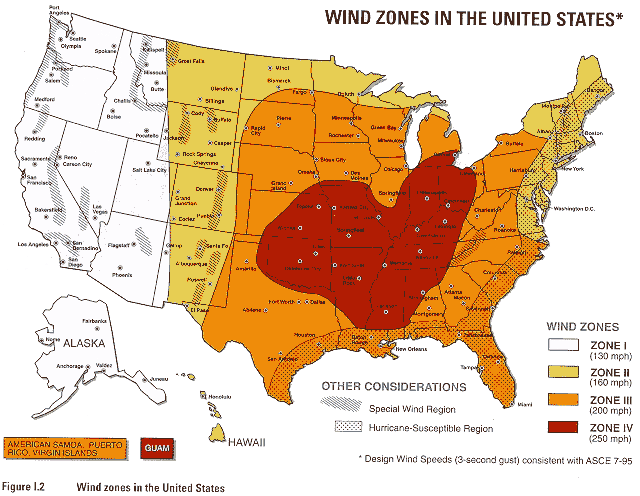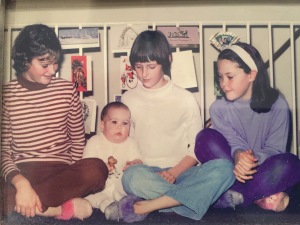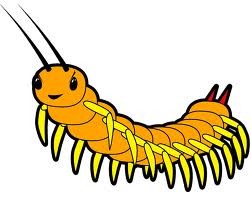
by bsquared5@aol.com | Jan 24, 2015 | Thoughts
When you live where we do, you get used to hearing tornado warnings on TV, usually in the spring. I’ve lost count of how many tornadoes have swept through our area with the accompanying hail storms, wind damage, and insurance claims. The weather man’s refrain is stuck in my head like an 80’s song. “Find your safe place. Go to an interior room with no windows. Cover your head.” For now, that place is our closet, where many times we have crammed in beneath the hanging pants with our sleepy children and uncooperative pets in the middle of the night.
Some friends of ours relocated here from out west, and they recounted their reaction the first time they heard the unfamiliar urgent warnings. As they should, they took it seriously and huddled in the bathtub together, hunkering down. “Cover your head,” the weather man said, so they earnestly scrambled to follow directions. They ended up making their children wear bike helmets while they each donned 5-gallon buckets from Home Depot. I always chuckle when I remember their story, imagining the newspaper photos and puzzled looks from the authorities if their house had been swept away and they’d been found that way, staggering out from the wreckage topped with buckets.
In the movie Unbroken, depicting the incredible life of Louis Zamperini, there’s a scene where he and two other men from his unit are stranded on a life raft in the middle of the ocean. As they’re floating along with the sharks, figuring their odds of survival are slim, one of his buddies says to Louis, “I’m glad it was you.” If your plane is going down and you’re faced with many lean days in the middle of nowhere, you hope you’re paired with someone decent, level-headed, and strong.
I think of myself as a realist, which is why when it comes to relationships I tend to discard Nicholas Sparks and other sappy fodder. In my experience, real life tends to be more like Louis’ lifeboat or the tornado closet. Don’t get me wrong. I believe in butterflies and a twinkle in the eye. Even, perhaps, in love at first sight. But pheromones and weak knees aren’t going to get you through the storms. And as anyone who’s been married more than a couple of years can tell you, butterflies have a short life span.
I always thought the traditional marriage vows should be more specific. Maybe if they were, fewer people would actually marry for superficial reasons. Instead of:
I, (name), take you (name), to be my (wife/husband), to have and to hold from this day forward, for better or for worse, for richer, for poorer, in sickness and in health, to love and to cherish; from this day forward until death do us part,
How about:
I, (name), take you (name), to be my (wife/husband), to have and to hold from this day forward, through infertility, miscarriages, and the loss of a child; through late nights worrying about a sick baby or a wayward young adult; through special needs and learning disabilities; through bankruptcy and job loss; through bad investments and mounting debt; through annoying habits, hair loss, and weight gain; through scary diagnoses, surgery, and recovery; through loss of grandparents, parents, and others; through bad decisions and character flaws; through dementia and cancer, stubbornness and selfishness. I pledge to love and cherish you, to be faithful to you no matter what, and to hold you up when you’re weak, scared, or too tired to go on. Forever and ever, Amen.
In the movies, they say, “You’re not the person I thought you were.” They say, “You’ve become someone else.” They say, “I’ve fallen out of love with you.” Unless they’re stuck in the ridiculous body of a 100-year-old sparkly vampire, of course the person you marry will change. Don’t you hope they will? If you’re not different at 50 than you were at 20, then you are stagnating. If life, loss, and parenthood doesn’t change you, then you’re more of a statue than a human being. Newsflash: real marriage is not like the movies. It doesn’t wrap up after an intense star-gazing courtship and end happily at the altar while the credits roll. That’s just the start. You’re fresh off the assembly line and have just hit the road. Once the warranty runs out, you can expect the new smell to wear thin and a couple of dings to appear on the bumpers. That doesn’t mean it’s all a big mistake or you’ve missed your destiny. It may just mean that you’re doing it right.
Gold, like that ring on your left hand, is a soft metal. It bends. It is easily hammered, forged, changed.
Long-lived, married love is not the butterflies, although they’re there in the distance. It’s often brilliant and easy, comfortable and true. It’s a choice you make every day to stay. To be faithful, to make an effort, to be available, to help each other grow. It’s something you cobble together, every day, day after day, by choice and sometimes by sheer force of will as you grit your teeth and bear down. And if you do that, over and over, day after day, then sometimes, in moments that may startle you, the butterflies revisit. They alight when you see your husband patiently helping with math homework or when he fills the car up with gas, when your wife rocks and sings to the baby, when you see him decked out in a great suit, or when she’s curled up asleep on the pillows. If all you’re after is a constant stream of giggles and stolen kisses, then you’re a string of affairs waiting to happen.
You can’t always predict the way a person will react to disappointment or tragedy. But watch the way they handle a traffic jam, plans that changed at the last minute, lost keys, or a phone call to Comcast. Witness their response to someone else’s sadness or bad news. Is there compassion? Patience? Empathy? Even-temperedness? If necessary, would you want to be in a lifeboat with them? If you heard the weatherman say “Hunker down, folks and find your safe place,” would it be with them?
Sometimes when we’re dating we may be so busy star-gazing and dreaming about the warm, sandy beach honeymoon and the picnics with flowers and wine, that we forget about the likelihood of hurricanes. And sometimes, despite our best efforts, we can be blindsided by a tsunami that devastates everything in its path and leaves us clinging to a tree for dear life. Sadly, some storms, with some people, just cannot be survived.
After being married only a few years, I once said to a group of women that your husband (spouse) kind of has to love you, they’re like family. A woman I’d just met corrected me sharply. “Oh, no, they don’t,” she said. “You were born into your family. Your spouse has a choice to make.” Her husband had recently left her. Take away lesson: for better or for worse, but never, never for granted.
At the end of our wedding ceremony, my husband and I walked down the aisle to “When I’m 64” by the Beatles. Will you still need me, will you still feed me, when I’m 64? We have quite a few more years before we hit that mark, but so far I’ve always been able to look over and say, “I’m glad it’s you” when the high winds have started to howl. Sometimes we may look silly stumbling along with buckets on our heads, but I’m grateful that we are each other’s safe place.
by bsquared5@aol.com | Jan 14, 2015 | Thoughts
I am a fourth-born and a first-born. My parents had this great little family of 3 daughters, each two years apart. Then they waited 8 years and had me and my younger brother in quick succession. Though this technically ranks me fourth, the large gap made us kind of a split-level family, and I got the typical first-born personality while resting firmly in the middle of the pack. 
This also meant that my older sisters had two different parents than my brother and I. Oh, they were the same mom and dad, but my sisters had them when they were young and fresh. My brother and I, as usual, got hand-me-downs. Parents worn out and frayed from years of use, whose eyes were not as vigilant, and whose determination to teach us certain skills was lagging. The older three always accuse my brother and me of having some sort of fantasy childhoods, with no supervision or required chores (but they’re not at all bitter).
Their tales of responsibilities and chores could be true. My “hand-me-down father” used to make me spend hours hand-trimming the St. Augustine grass under the chain-link in the backyard because the fence supposedly damaged the weed-eater’s trimmer line. I suspect this was less of a fact and more of an excuse to get me outside and building character. If this was an example of his lighter, more relaxed task-doling, then maybe they really were triple Cinderellas.
In my sisters’ childhoods, before my brother arrived as the family’s caboose, my father taught all three of them to play softball. My grandmother (his mom) scolded him, terrified he pitched way too fast. He argued that if he didn’t pitch fast and hard, they wouldn’t be motivated to catch the ball. When your options were to either catch it or get beaned by a 50 mph fast ball, you quickly developed good hand-eye coordination. All three of them played on girls’ softball leagues and could hit, field, and run like Geena Davis in A League of Their Own.
By the time I was old enough to have a go, the gloves were already broken in and soft. All but one sister had flown the nest, and either my father’s interest had waned or, more likely, a decade or more had passed and he was just more tired. He had already taught the sport three times and maybe he had run out of gumption to do it once more. I never caught a blazing softball and, as a result, was one of those picked last in junior high gym. In fact, I never played any team sport, and while my brother did, he didn’t stick with any of them for long. We each ended up preferring more solitary activities: him, fishing; me, riding horses.
My hand-me-down parents may have been worn out from repeatedly raising toddlers and teens, but they were also wiser. In his fascinating book Outliers, Malcolm Gladwell explains how the magic number of becoming an expert at something is 10,000 hours of practice. If you go by the numbers, after just one year (8,760 hours) of parenting, you’re already almost a success. The catch, and there’s always a catch, is that right about the time you’re an expert on babies, they become toddlers and you’re back at ground zero. Then they hit kindergarten and everything changes. Dump some hormones and puberty in the mix, and just when you thought you were making progress, you go straight to jail, do not pass Go. Becoming an expert in parenting (if there even is such a thing) takes twenty times longer than any other skill because the target keeps moving. (Gladwell has no children, by the way.) Because they had so many of us, my parents had gone through these phases multiple times and were experts 10 times over by the time my brother and I arrived on the scene. Raising two more kids was like buttah.
If we didn’t change and grow as we age, if we parented all our children making the same rookie mistakes we made on our first-born darlings, it would be weird. I hope I’m not the same parent in my 40’s as I was in my 20’s! This morphing parent phenomenon is most obvious when your own parents become grandparents. Our jaws have dropped on more than one occasion when our parents have allowed our kids to do things that would have earned us a well-tanned hide. Remember the Abraham & Isaac story? Faithful Abraham dutifully prepared to sacrifice his teenage son. Show me the altar, he said. (They’d probably just been arguing about too much texting or getting the car keys to go the mall.) I’ve often said that if Isaac had been Abraham’s grandson, Abraham would have scooped him up and run like the wind, and Genesis would read very differently.
My husband and I discuss this in wonder. Who are these people? They are not the same people who raised us. And if they’re doing it right they shouldn’t be. The Skin Horse in the classic Velveteen Rabbit story explains how being loved by a child makes you more Real: “It doesn’t happen all at once. You become. It takes a long time. That’s why it doesn’t happen to people who break easily, or have sharp edges, or who have to be carefully kept. Generally, by the time you are Real, most of your hair has been loved off, and your eyes drop out and you get loose in the joints and very shabby.”
I appreciate my sisters blazing the trail with our parents. They got the handmade clothes, bad bangs, and strict curfews. It’s a mixed bag, though. The hand-me-down parents I got may have been more relaxed and financially better off, but no matter what my brother and I threw at them, it wasn’t their first rodeo, and they fielded our fastballs with ease. As younger siblings we did have the benefit of watching and learning from everybody else’s experiences. From my sisters we learned not to let dad catch you sit ting around watching TV when he got home from work, and the best time to ask mom for permission for something was when she was almost asleep in her chair.
ting around watching TV when he got home from work, and the best time to ask mom for permission for something was when she was almost asleep in her chair.
When we compare childhood experiences, we marvel at how different they are. It’s not like they were in a gulag and we were raised by wolves, but to hear them tell it, well, almost. Thanks for limbering them up for us, guys. Way to take one for the team!

by bsquared5@aol.com | Jan 10, 2015 | Thoughts
Most of what I remember of family vacations growing up was being stuffed into our station wagon with all five kids. We’d fight over who had to sit on the hump in the middle of the back seat, who had to be crammed into the rear (car seats were unheard of), and who got to ride in the back window. Aside from getting carsick from the sun baking you to a crisp through the glass, the back window held the most potential for excitement on an otherwise boring road trip. Occasionally my father would have to stop fast, which would send whoever was riding in the window barreling off into the floorboards of the back seat. If we happened to get off the interstate onto a back road, he would zip up the hills so we’d catch a little air in the car coming down the backside, stomachs flip-flopping, better than a roller coaster.
My father liked to make good time. Inevitably, when we got to our destination, usually our grandparents’ house, he and my grandfather would use the first half hour of our arrival to discuss this very thing. “Took the bypass around Atlanta and saved about 40 minutes.” “Yeah? You coulda come up through Birmingham instead.” “Tried that last time. I think this way was faster.” And on and on. And on.
Maybe it was knowing this analysis was coming that made him averse to stopping along the way. The man has a bladder of steel. In a car with five women (my brother doesn’t count–he was still in diapers), you’d think he would have gotten accustomed to having to stop more than once every six hours. He’d be burning up the miles, passing all the ying-yangs that obviously had nowhere important to be when one of us would send a covert message up front to our mother that worked something like this: Kid in window taps back seat sister on shoulder. “Tell mom I have to pee.” Back seat sister’s eyes widen and she leans forward to tap middle seat sister on shoulder. “Kid in window has to pee. Pass it on.” Eventually mom would get poked on the shoulder and a quiet jerk of the head would indicate that She Who Shall Not Be Named way in the back has to go. You could see Mom’s shoulders sag a bit as she’d cough and try to start up a pleasant conversation about how it had been awhile since we stopped last and maybe we should start looking for an exit.
This could go on for a bit until finally my father would heave a loud sigh and glance in the rear view mirror towards the back of the car, his roving eye seeking out the culprit. We all avoided eye contact and pretended to be reading. Once we’d pulled over, he’d stand by the car as we all piled out and raced in to the filthy gas station restroom, trying to beat each other to the one stall available, knowing this could be the last mercy we’d receive for several hours. Once we got back on the interstate, my father would grumble each time he’d pass someone he’d just passed 30 minutes ago, all his progress unraveled by weak female bladders.
My little brother got carsick once when he was about two. Knowing my father’s reluctance to stop, and being a 14-year-old teenager who thought the whole thing was totally gross, my sister’s answer to that was to dangle my brother out the back window as he threw up all down the side of the speeding car. Her hands gripped his legs while my mother screamed from the front, “Don’t you let go! Don’t you dare let go!!” A quick drive-through car wash at the next gas station, and problem solved.
So you’d think I would have learned from all this. You’d think, but no. One Christmas, my mother-in-law and I arranged to take Savannah to the Belle Meade Mansion for a fancy dress-up Victorian holiday tea. It was lovely. We learned etiquette, walked the grounds, nibbled dainty cookies, and drank a lot of tea. It came time to go, and Savannah and I got in our van and started off through Franklin towards home. It had gotten dark and I remember thinking I probably should have gone to the restroom before we left, but the drive wasn’t that long.
I didn’t count on George Jones. I’m not a country music fan, but we are practically a suburb of Nashville, and if you live around here, you’ll eventually encounter some country music star in one way or another. For years, George and his wife Nancy decked out their home in Franklin with a massive Christmas light display, and the public was free to drive by, get out, and take pictures. As we neared the Nestle Down Farms entrance, the two-lane traffic started to slow, then creep, then halt altogether. “Uh-oh,” I thought, as my leg started to jiggle. “Not good.”
This road not only has no shoulder, it has an anti-shoulder, with dark, brambly ditches on either side where critters with sharp teeth and shiny eyes probably lived. The way we were traveling, we were going uphill, so there was no visibility for oncoming traffic on the other side of the hill. Passing the backed-up, stand-still Christmas light gawkers was not an option. From the dark back seat, my daughter announced she had to go to the bathroom. I’m not above using the side of the road when it’s an emergency, but not in bumper to bumper traffic with oncoming lights spotlighting your private moment. Time passed. No amount of leg jiggling would suffice any longer. I looked frantically around the car for something, anything we could use. There! Savannah pulled an old red solo cup from under the back seat. I told her she could unbuckle and try to go in the aisle of the van. Desperate, she complied. I rolled down the back window and she emptied her cup onto the road where we sat, unmoving. My turn.
I was in the driver’s seat and didn’t want to abandon my post in case we ever started moving again. It could be any minute now. Having birthed two very large babies, my anatomy was not what it used to be and my poor bladder had strained to the breaking point. I put the van in park, struggled out of the constricting tights I had on for the fancy tea (Tea! I couldn’t even think the word!) and tried to half stand up out of the seat, while acting normal and casually waving to the oncoming cars. I was afraid their lights would reveal the desperate state I’d been reduced to. At last. I filled the red solo cup in my seat. But I had had a lot of tea, and it had been a very long time by now. My cup overflowed. Down the crack of the back of the seat, where years of lost coins and cheerios lived. Out the back and onto the carpet below, soaking stray hair ties and kids’ meal toys. Savannah held her feet high in the air. There was no stopping at this point. I couldn’t quickly empty the cup and start over–there was no time! Nature called, and this was a natural disaster.
Savannah yelled. I screamed yet still casually waved to the oncoming traffic, my skirt bunched under my armpits to save it from the flood. Yes, yes, move along. Nothing to see here. Oh, and look! Traffic started to move! My right hand shifted into drive, while my left hand held the useless cup, and I gently pressed the gas pedal with my tiptoe. Finally, blessedly, it stopped. I rolled down the window and emptied the cup as we moved, Savannah’s window in the back now sprayed with well, you know. I managed to grab as many stray napkins as I could reach and stuff them into the back of my seat so I could sit normally again and drive like a sane person.
As we passed the entrance to the subdivision, where cars snaked down the road to the Jones’ residence, Savannah said, “Look at the lights!” Yes, look. Look what the cheery little Christmas lights had brought us to. I was no longer feeling festive and just wanted to get home to take a shower. The van grew silent. I told her we would never speak of this. When we finally traded in our child-trashed van, I admit I did not fully disclose what had happened in the driver’s seat. (My apologies to any future owners, but I did try my best to chlorox it thoroughly.)
George Jones died a couple of years ago, and last I heard the house was up for auction. No more dazzling light display to back up traffic for miles. Every time I pass that subdivision in Franklin, I think about that desperate night in the van, which gets me thinking about my little brother being hung out the car window, and I realize that, at least for our family, it must be just part of life. You’ve gotta do what you’ve gotta do. A dose of humility is good for the soul, right?

by bsquared5@aol.com | Jan 4, 2015 | Thoughts
Unbeknownst to my parents, my brother once kept a rattlesnake in an aquarium upstairs in our house. It was housed right next to its friend the moccasin in another aquarium, a duplex of sorts. He’d captured them in the state park across the street from our home, as a testament to his “snake whisperer” ways, and to prove to the park ranger who ran the nature exhibit that they did, in fact, appear locally. They lived upstairs in harmony for about two weeks until my mother discovered she’d been sharing her dwelling with two reptiles that harbored poisonous venom in their fangs. I’ll leave it to you to imagine the tirade that ensued before their eviction.
The moccasin was aggressive. It would actually come towards the glass if you approached, like: bring it, bro, you want a piece of me? Snakes are all muscle and can easily lift a mesh aquarium top with their bodies. Some friends of ours used to own a pet store, and they discovered this the hard way when a snake “went missing.” It was found a day or so later wrapped up nicely with the vacuum cleaner cord, clever camouflage until it was time to tidy up the store. (You’re going to think twice before you pull out your vacuum next time, aren’t you?)
The rattlesnake was shy and preferred to stay hidden. Tapping on the glass or sometimes even footsteps coming up the stairs were enough to start the ominous rattles shaking, warning off the intruder. I don’t want to fight you, but I will if I have to, they implied.
In college, my roommate Cindy and I were on a retreat one weekend in the Smokies. We went hiking with a large group but eventually got so far behind that we found ourselves alone at a fork in the path. Murphy’s Law: we took the wrong fork and were lost for a couple of hours, winding around in the woods until we came to a rocky overhang. We were talking and laughing, paying little attention to our surroundings, until I almost stepped on a rattler, coiled up like a spring in the middle of the path. We did a high-stepping snake dance, screaming in stereo and jumping into the brush. Giving him a wide berth, we edged along the rocks until we could pass safely. Of course, because we had been going the wrong way, we had to go back by him again once we realized how to get back to civilization. At the time, I didn’t care that the snake was shy and panicked. Every nerve in my body screamed “run away!”
It’s no coincidence that when I was between the ages of 12 and 15, my father came up with an endearing nickname for me. Princess? Sweetheart? Lovey? Nope. Rattlesnake. If you’ve ever actually had contact with a teenage girl around this age, you will totally understand. Moody and preferring isolation, my “rattles” sounded all the time. Leave me alone. Get lost. I don’t want to fight you, but I will if I have to. And if you poked too much, the venom would spray.
It was such an apt nickname, better than he knew. All my rattles and venom were defensive, spring-loaded for anyone who dared to get too close, a knee-jerk reaction to all those raging hormones. (Side note: do hormones ever do anything besides rage? I picture them in a loud, torch-carrying mob, storming the castle in the night.) It was all bluster. Just a front for whatever fear, anger, anxiety, or sadness I felt at the time. For some reason it all came out as fangs and rattles, and my family gave me a wide berth.
Fitting that I had to navigate this same wilderness with my own daughter at these ages. My mother always said I’d have a child just like me. After an attempt at conversation with her once, my father, as adept at nicknames as Sawyer on L*O*S*T*, dubbed her “Scratchy Cat.” Perfect.
Although I’ve outgrown the nickname, still there are times when I’m tired or emotional, and in the back of my head I detect a faint sound of maracas. My dear husband might say the sound is more than just faint. REO Speedwagon has a song with the lines
You played dead
But you never bled
Instead you lay still in the grass
All coiled up and hissing.
Despite that, the singer says he’s “gonna keep on loving you.” That’s all we misunderstood rattlesnakes need, really. Someone to see through the scales and hiss to the person with feelings underneath. Thankfully, I’ve had friends and family brave and kind enough to quash their tendency to scream and run. I’m a little more understanding to those quick to rattle and spit because more often than not it’s all smoke screen.
In any case, if somewhere down the road I completely change my image and become a leather and chains biker babe, I’ve got my name all picked out. Just call me Viper.

by bsquared5@aol.com | Jan 2, 2015 | Thoughts
The centipede was happy, quite,
Until a toad, in fun,
Said, “Pray, which leg goes after which?”
Which raised her mind to such a pitch
She lay distracted in a ditch considering how to run.
Around age 4, I memorized this poem (Katherine Craster, 19th c.). The first time I recited it to my mom, she felt sorry for the centipede. Poor little thing, blindsided by the spiteful toad. I still remember it today because I must have quoted it to her a hundred times. I’d say it when I was on the verge of getting in trouble or when I wanted something very badly because it never failed to make her smile. It got to the point where I would only have to say the first line and she’d hold up her hand and shake her head: “Ok, ok.”
Turns out there’s actually something called the centipede syndrome, where some automatic activity gets disrupted by being conscious of it, like when that word you’ve spelled a hundred times suddenly looks weird–no, that can’t be right, is it? Or all of a sudden you’re tripped up on a song you’ve played on the piano countless times. Wait–is that the right note? Or a skill you could do blindfolded–swing a golf club, braid your child’s hair, make that bread recipe–causes you to stumble, question, doubt.
At this point in life, it’s dawning on me why my mother may have felt such affinity for the centipede. (It’s really a creepy sort of insect–all those legs!) Despite watching her do the same, I’ve wasted a large chunk of time second guessing myself. Maybe this is true for all but the most self-assured and self-confident of us. Our looks, our skills, our passions–who we are–is questioned and criticized at every turn by toads in our lives. Even very well-meaning toads, who may just be trying to make a suggestion.
For me, it started in elementary school, when some tall popular girl looked over at my paper and with a sniff asked, “Why do you make your ‘S‘s’ like that?” Like what? Is there something wrong with my cursive S? Is it deformed, defective, lame? It didn’t occur to me to wonder what made her think her S was somehow better than mine. I just assumed it must be and–here’s the kicker–changed my handwriting.
Now if this had been some character flaw that a wise and gentle teacher had pointed out to me, that would not have been such a bad thing. Some criticism is deserved and necessary for maturing and growing. But not all criticism. Many times, I’ve had pointed out to me that I’m too quick to get angry, too impatient, too (gasp!) bossy. All true. But my S was just fine.
So many times I was tooling along blissfully like the centipede, oblivious that what I was wearing, how I cut my hair, how much I weighed, which boy I liked, what books I read (or didn’t), what music I liked (or didn’t), what I was good at (or wasn’t), what college I attended, what my major was, who my friends were, what I believed, how I raised my kids, where I lived, what I drove…was somehow wrong, or inadequate, or less-than. Then a toad would hop by, make a passing comment, and let the second guessing begin!
My mother would actually get debilitating migraines, working herself into being sick over something she’d said (or hadn’t) or some way she was somehow supposedly not good enough for the company she’d kept. Me? I twisted my hair. Made great, hopeless, tangled knots that could sometimes only be cut out. She was a daughter who yearned to read and learn in a time when she was told she was only good enough to be a secretary, so college would be out of the question. I was a daughter who was told I could do and be anything, but I was paralyzed by doubt, my S‘s never quite up to par.
For awhile, we each tried to change who we were, which resulted, as it always does, in disaster–migraines and knotted hair. A few years after my brother was born, while my father was on a tour of duty, my mother finally enrolled in some college classes–literature and writing. Probably not the best timing, with five kids underfoot and an absentee husband, but she’d squashed a toad or two under her heel, and I’d never seen her happier.
The older I get, the less I pay attention to the toad voices. The more I realize that their croaking doesn’t matter, isn’t even true most of the time. Instead of spending time at the pond, listening to their chorus, I tend to walk away once they start up these days. I don’t have time for that anymore. This outfit? It’s comfortable. This hair? Curls will just have to do. That book/music/movie I like? It says something to me and that’s enough. And my passions? I’m sorry if they’re not yours, but they give me joy and purpose. My centipede legs keep on trucking just they way they’re meant to.
Occasionally, a “toad” will still trip me up, causing me to question, but I’m getting into enough of a rhythm now that I mostly hear the croak as a distant echo and no longer let it get stuck in my head like a song you can’t get rid of. Give me another decade or so and I hope I’ll be doing the centipede can-can, kicking my hundred legs like the Rockette’s. Meddling toads begone! I don’t believe in you.
by bsquared5@aol.com | Dec 22, 2014 | Thoughts
Charlie Brown’s Christmas tree has always confused me a little. I don’t know if it was a symptom of being in a regimented, military family or just the fact that over half of us were decidedly Type A personalities, but there was no way our family tree ever would have resembled the “sad little tree” from the movie. Christmas was always a happy, much-anticipated holiday, but there were Certain Unbreakable Rules for the tree that somehow were just understood. It might or might not be the case that if any of these rules had been broken, Santa would somehow miss our house for the year.
Type A personalities, but there was no way our family tree ever would have resembled the “sad little tree” from the movie. Christmas was always a happy, much-anticipated holiday, but there were Certain Unbreakable Rules for the tree that somehow were just understood. It might or might not be the case that if any of these rules had been broken, Santa would somehow miss our house for the year.
My kindred Type A brethren might recognize some of these Tree Do’s and Don’ts (can I get an Amen up in here?):
- The tree can be real or artificial, cut or live, but it must be green. Pink, white, or other rainbow-hued Christmas trees do not occur in nature; thus, they will not occur in the house.
- No matter what tools, props, or physical contortions are necessary, the tree must be straight. Plumb lines can be dropped from the top of the ladder if necessary. You can turn the “bad side” towards the wall, but from top to bottom, no tilting allowed.
- Lights must be evenly spaced and working. Steady or twinkling–either is ok–but dark spaces or blank spots practically negate Christmas altogether.
- This should go without saying (*smh*), but a tree should be a tree, not a string of ropes on a wall, not a triangular stack of 7-UP bottles, or any other non-tree, Pinterest-inspired creation. And for goodness sake, it should not be hung upside-down from the ceiling! How can you lie underneath the branches on Christmas Eve dreaming of presents when you’re looking at the pointy top instead of the broad underside of the tree? Answer: You cannot.
- If you MUST use tinsel (or icicles), and I am strongly against it, it cannot be clumped and thrown on in bunches. Even if it takes two entire tedious days, tinsel must be placed strand-by-strand on the branches, to give the effect of shimmering snow. If you have animals prone to eating this surgery-inducing stuff or a vacuum cleaner that recoils and refuses to work at the sight of it, be sensible and banish it forever from your Christmas tradition.
- A word about garland. Shiny metallic garland is tinsel’s country cousin. No. Just no. If you must string something, go old-fashioned and make some popcorn strings or cranberries (but not if you have hungry pets). Or go with felt balls, wooden beads, or possibly wide, wired ribbon. It’s just extra work because the swags must be even and spaced correctly from top to bottom or it’ll look like a badly wrapped gift.
- Ornaments can be lots of things–handmade, glass-blown, kid crafts, or whatever, but they, too, must be spaced evenly around the tree so that it’s balanced. Noticing a spacing theme yet? If you let your children decorate it, everything will be hung on the bottom third of the tree, within their reach only. If you have very small children or persistent cats or puppies that want to eat everything, you’ll tend to decorate only the top third of the tree. Just like middle children, the middle third of the tree cannot be neglected because the rest demands attention! Balance. As with the lights, no big empty spaces and no bunches or clumps.
- Colors must mix. Don’t put all the red balls together in one spot. They’ve been stored in boxes all year and this is the one time they get to come out and mingle with others. Be sensitive to their feelings.
- What goes on top? So many options—angel, bow, star, weird vintage spire–any of these work. Whichever you choose must be proportional to your tree, and the top branch has to be sturdy enough to–wait for it–remain straight (see #2). Don’t tie a tiny red bow on a 9 foot tree. Don’t put a huge, hulking angel on a little 3-foot table topper.
- Timing. For the true Type A person, Christmas trees cannot be seen before Thanksgiving. Even if they’re banging away on the attic door like someone’s crazy locked-away aunt, begging to be let out, do not give in. It’s an abomination. Conversely, they must be down and re-stowed before the New Year. Lights left on the outside of the house after this point mark you as lazy and oblivious.
If you want to be all like “Oh, family is more important than doing it right” and “Christmas should be fun and free-spirited,” then be my guest. Go ahead: wake up Christmas morning to your haphazard, crazy pink tree and go through the motions, but we’ll all know it won’t really be Christmas at your house. Me, I’ll be basking in the balance and greenery, carefully un-taping the paper on the presents and saving the bows for next year.



 ting around watching TV when he got home from work, and the best time to ask mom for permission for something was when she was almost asleep in her chair.
ting around watching TV when he got home from work, and the best time to ask mom for permission for something was when she was almost asleep in her chair.


 Type A personalities, but there was no way our family tree ever would have resembled the “sad little tree” from the movie. Christmas was always a happy, much-anticipated holiday, but there were Certain Unbreakable Rules for the tree that somehow were just understood. It might or might not be the case that if any of these rules had been broken, Santa would somehow miss our house for the year.
Type A personalities, but there was no way our family tree ever would have resembled the “sad little tree” from the movie. Christmas was always a happy, much-anticipated holiday, but there were Certain Unbreakable Rules for the tree that somehow were just understood. It might or might not be the case that if any of these rules had been broken, Santa would somehow miss our house for the year.